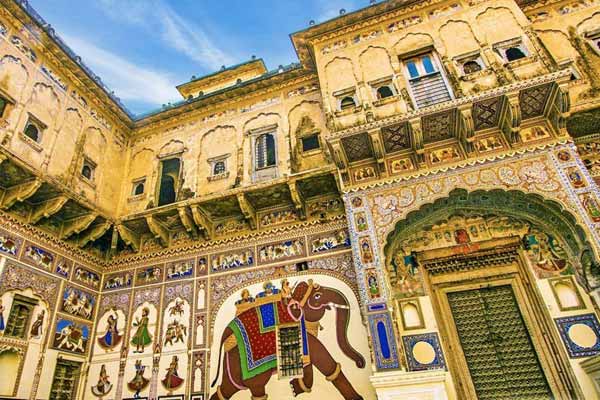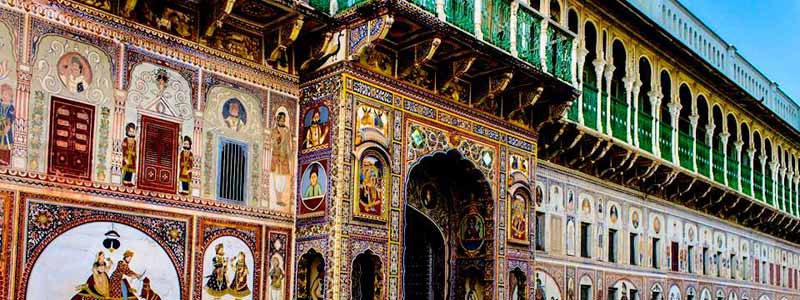Best Time To Visit Shekhawati In northern Rajasthan, Shekhavati is a semi-desert area and is located in the Delhi-Bikaner-Jaipur triangle. Shekhawati is a town, not just a city or fort; it takes its name from Rao Shekha, its ruler. Shekhawati means Shekha’s garden.
For their amazing painted Havelis, the cities of Shekhawati are renowned. Such is the Havelis’ appeal that this area is called the “open art gallery of Rajasthan” In a rich artistic tradition, the plethora of painted Havelis makes it commendable and interesting. Most of the buildings date from the early 20th century to the 18th century. So many Havelis dot the Shekhawati landscape that tracking them is something like a treasure hunt.

The walls and the ceilings of these buildings are decorated by various types of fine art, complementing the otherwise flat and barren ground. The Havelis are known for their frescoes depicting themes of mythology and that of giant animals. Some later day frescos display the arrival of the British and certainly highlight steam locomotives and trains for the benefit of those household members Who have not traveled to distant places by train or have seen this newly introduced mode of transport.
Forts, small castles, mosques, wells called baolis and chattris can also be discovered in the Best Time To Visit Shekhawati region. The Rajputs represented the themes of historical events, folk-heroes of characters and famous war scenes, Although the Marwaris focused more on religious themes, the themes also started to divert towards modern views over the course of time.
Best Time to Visit Shekhawati
Best Time to Visit Shekhawati In the colorful state of Rajasthan, Shekhawati is popularly tagged as the ‘Free Art Gallery of Rajasthan‘ for its grand forts, historical architecture and havelis. While Shekhawati is accessible all year round, winter is the best season to visit Shekhawati. The temperature stays cozy and is great for sightseeing. The best months to visit are October, November, December and March.

Winter:
In Shekhawati, November marks the beginning of winter, which lasts until February. One can enjoy seeing all of Shekhawati‘s wonderful sightseeing places during this season. The atmosphere is pleasantly cool and is perfect for exploring the beautiful area. The temperature normally varies in winters from a cool 5 ° C to 28 ° C.
Summer:
The Shekhawati summers are incredibly hot and exhausting. Shekhawati has hot summers in the desert area, and a visit between May and July would restrict the fun of holidays as one can not hop around. In the months of March to June, the temperature varies from 32 ° C to 45 ° C.
Monsoon:
In July, the Shekhawati Monsoon arrives and lasts until September. It’s characterized by a cool breeze and a nice climate. Because of this, in a cool and pleasant atmosphere, one can enjoy the beauty of the country.
Places to visit in Shekhawati
Best Time To Visit Shekhawati there are many cities to see and wander around to witness the beauty of this painted country. Here we have listed the best places to visit in Shekhawati, Alsisar, Mandawa, Dundlod, Fatehpur, Ramgarh, Bissau, Mahansar, Khandela, Jhujhunu, Sikar, Khetri, Nawalgarh, Mukundgarh, Bagargarh are the key attractions in the area, Chirawa and many more… We also cover parts of Churu and other neighboring districts of the Shekhawati region where tourists to this area of Rajasthan are concerned with the art and culture attraction points.
Nawalgarh
Nawalgarh is well-known for its gorgeous havelis, situated halfway between Jhunjhunu and Sikar. It is also a favorite location for filmmakers, and many films have been shot here in India and internationally. Nawalgarh Fort, which was constructed by Thakur Nawal Singh, is a popular attraction here. One kilometre from Nawalgarh Fort, Roop Niwas Palace is a charming palace with beautiful gardens and a fountains. It is now a heritage hotel.
Alsisar
Alsisar, a small town, is surrounded by arid deserts in Jhunjhunu. Alsisar was awarded by his aunt, Thakur Pahad Singh of Heerwa, to Thakur Samarth Singh, who made it his capital in 1783 AD. The famous Alsisar Mahal was designed by Best Time To Visit Shekhawati Thikanedars, a fine example of Rajput architecture with its fresco carvings and representation of historical events on its walls. Alsisar is known for its Rajasthani hospitality, and along with its famous castles, havelis and cenotaphs, visitors flock here to get a taste of that. Make sure you pay a visit to, among others, the Kejriwal Haveli, Laxmi Narayan temple, the cenotaph of Thakur Chaatu Singh, Ram Jas Jhunjhunwala Ki Haveli.
Mandawa
Mandawa once functioned for goods from China and the Middle East as a trading outpost for ancient caravan routes in Shekhawati. To defend this outpost, Thakur Nawal Singh, then the ruler of Nawalgarh and Mandawa, constructed a fort. A township developed around the fort over time and soon attracted a large population of merchants, who then settled down at Mandawa.
Fort of Mandawa, Lord Krishna and his cows adorned him with his drawn arched gateway. Beautiful frescoes, intricate carvings and mirror work are designed in line with a medieval theme and add to its charm. The Mandawa Fort, situated in the middle of the town, has now been converted into a heritage hotel. Mandawa is also known for its pretty havelis.
Dundlod
Dundlod, a town famous for its fort and havelis, is located in Jhunjhunu. This fort was founded by Keshari Singh, son of Sardul Singh, the Rajput king, in 1750. By road from Delhi, Jaipur, and Bikaner, Dundlod is easily available. A mixture of Rajput and Mughal art and architecture is the Dundlod fort.
Ram Dutt Goenka’s Chhatri (cenotaph), located near the fort, is also a popular tourist attraction. The dome of the cenotaph, built in 1888, is decorated with floral motifs with banners extending from the center. In Dundlod, the Marwari breed of horses, which are now finding their own identity all over the world, were born Best Time To Visit Shekhawati.
Rani Sati Mandir
Rani Sati Mandir is a well-known temple located in the Rajasthan district of Jhunjhunu. Having a history of more than 400 years, this temple is an example of feminine courage and spirit. It is also known for its splendor and extraordinary paintings. It is also part of one of the oldest Indian pilgrimages ever organized.
Fatehpur
In 1508 AD, Kayamkhani Nawab Fateh Mohd founded the city of Fatehpur. In 1516, he built the Fort of Fatehpur as well. The city once served as Sikar’s capital. Today, Fatehpur is popularly regarded as Shekhawati‘s capital of culture. It is full of spectacular sights to visit, including Singhania Havelili, the Dwarkadheesh Mandir, The most notable ones are Nadine Le Prince Cultural Centre and Fatehchandka Haveli.
Ramgarh
The Poddar family founded Ramgarh in 1791, and back then it was considered one of the wealthiest towns in India in the 19th century. For its paintings, old temples, cenotaphs and havelis, Ramgarh is popular. In terms of sightseeing, though Ramgarh has a lot to offer, the Ramgopal Chhatri (cenotaph) and Poddar’s Haveli are particularly popular among tourists.
Raghunathji Mandir
Raghunathji Mandir is located in the vicinity of Ratangarh Town, also known as Bara Mandir. The temple, dedicated to Lord Raghunath or Rama, an incarnation of Lord Vishnu, is thought to have been built in the early 19th century. With an elevated entrance, it is a single storied temple. It has a set of cupolas at the top of the temple. It is believed that the temple would free one from the pains of life Best Time To Visit Shekhawati.
Laxmangarh Fort
As the most impressive building in Laxmangarh city, Laxmangarh stands tall, towering majestically over the well-laid township on its western side. Laxmangarh Fort, an excellent example of fortress architecture in the whole world, is constructed on scattered bits of colossal rocks. The top of the ramp provides a fascinating bird’s eye view of the town of Laxmangarh designed to mimic Jaipur town layout. – Rajasthan’s bustling capital city.
Sethani Ka Johara
On the north side of the road, perhaps 5 km west of Churu along the Ratangarh Road, lies Sethani Ka Johara. It is perhaps the finest johara (reservoir) in the region in that keeping a store of water, often from one monsoon to the next, is not only attractive but also successful. It was constructed in 1899 by Bhagwan Das Bagla’s widow as part of the merchants’ famine relief projects Financed at the end of the century in those awful years. In winter, it attracts numerous birds and animals, including Nilgais, as a peaceful place Best Time To Visit Shekhawati.